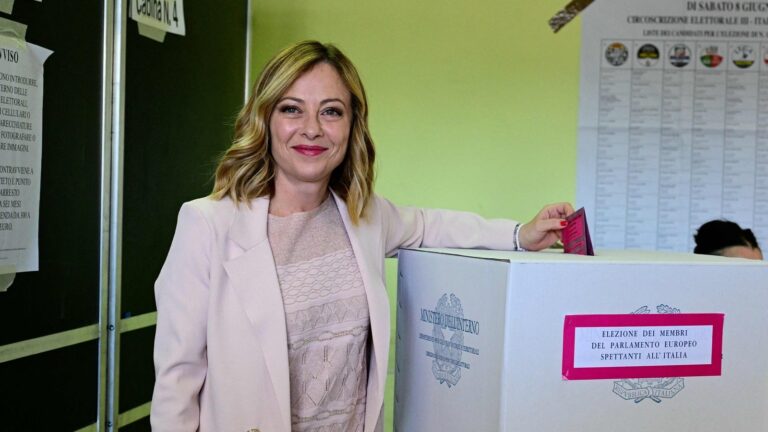Italy became the first major country to vote in the EU’s next parliamentary elections on Saturday, in a test of far-right leader Giorgia Meloni’s strength at home and his future influence within the bloc.
Most of the European Union’s 27 member states, including powerhouses France and Germany, will vote on the final day, Sunday, with the overall result due to be announced later that evening.
The first polling stations have already opened in New Caledonia, a French Pacific island territory hit by deadly riots this month.
Italy is the EU’s third-largest economy and holds 76 of the 720 seats in the new parliament, so the two-day vote could have major implications.
Voting in his Rome constituency in sweltering late spring heat, Meloni told reporters that the fight over Brexit “will shape the next five years”.
Opinion polls suggest that Meloni’s Italian Brothers party could win with 27 percent of the vote, more than four times its share in 2019, amid a rapid rise in far-right support across the European Union.
Walter Esposito, a 78-year-old Rome resident, voted for her party in protest against EU environmental policies, complaining that “Europe has always tried to destroy Italy and its people.”
Meanwhile, on the political front, 18-year-old student Carlotta Cinardi said she could not find a political party that “represented my views 100%”, but voted for the Greens as they are “the most progressive for young people”.
A victory for Meloni could establish him as the power player in determining whether EU Commission President Ursula von der Leyen can get the support she needs from both member states and Parliament for a second term.
Meloni is being actively courted by both the centre-right von der Leyen and Marine Le Pen, the far-right French leader who is seeking to form a right-wing EU supergroup.
But one European diplomat warned against overestimating her influence.
“Melloni will influence Italy’s interests in committees and in parliament,” said the diplomat, who spoke on condition of anonymity. “She will be in the game. But does that make her a kingmaker? No.”
Meloni is keeping his cards close to home for now but has made clear his intention to push left-wing EU parties into opposition.
– Alliance –
Public concern about the flow of illegal migrants across the Mediterranean was one of the key issues driving Meloni to take power in 2022.
Across the EU, immigration has become a key issue driving support for far-right parties, which are projected to win a quarter of the seats in parliament, but mainstream centres are still expected to come out on top.
Tens of thousands of demonstrators rallied in cities across Germany on Saturday, urging people to vote against the far-right party, the anti-immigration AfD, which has around 15 percent support.
Beyond the expected surge in support, analysts say the bigger issue is whether von der Leyen’s European People’s Party (EPP), the main party in parliament, will align itself with the far right.
Von der Leyen has suggested the EPP is willing to work with far-right lawmakers as long as they are pro-EU and not what she calls “puppets” of Russian President Putin.
For these reasons, von der Leyen explicitly ruled out cooperating with Le Pen’s National Rally (RN), which is leading the French opinion polls, or with Germany’s AfD.
Unlike Meloni, both parties are skeptical of EU military and financial support for Ukraine to counter Russian aggression, with the AfD opposing arms sales altogether.
In Hungary, where tens of thousands of people rallied in support of opposition leader Peter Magyar on Saturday, Viktor Orban’s ruling populist Fidesz party similarly opposes further aid to Kiev.
– Slovakia in disarray –
Italy voted on the same day as Slovakia, which is reeling from the assassination attempt last month on Prime Minister Roberto Fico. Slovakia has been a member of NATO and the EU since 2004.
Mr Fitch blamed the shooting on the opposition’s “aggressive and hateful politics” but it rallied voters to his pro-Russia camp.
Authorities said the assassination attempt on the 71-year-old poet was politically motivated.
Jozef Zahorski, a 44-year-old teacher, said he voted for Mr Fico’s ruling left-wing nationalist party, Smer SD, because it speaks for “Slovakia’s interests, not Brussels’.”
Mr Fitch’s party opposes EU arms deliveries to help Ukraine repel Russian aggression and has blasted alleged “warmongers” in Brussels.
Fico posted a photo on Facebook of himself voting from his hospital bed, and called on voters to “elect MEPs who support the work of peace, not the pursuit of war.”

